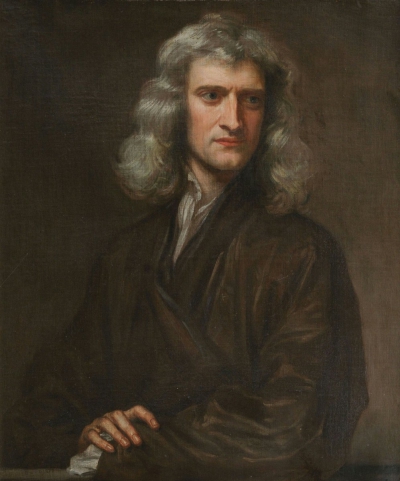Philosophi Naturalis Principia Mathematica (from Latin: Mathematical Principles of Natural Philosophy) by Isaac Newton, often referred to as simply the Principia (), is a work expounding Newton's laws of motion and his law of universal gravitation; in three books written in Latin, first published 5 July 1687.After annotating and correcting his personal copy of the first edition, Newton published two further editions, during 1713 with errors of the 1687 corrected, and an improved version of 1726.The Principia forms the foundation of classical mechanics. Among other achievements, it explains Johannes Kepler's laws of planetary motion, which Kepler had first obtained empirically.
The Principia is considered one of the most important works in the history of science. The French mathematical physicist Alexis Clairaut assessed it in 1747: "The famous book of Mathematical Principles of Natural Philosophy marked the epoch of a great revolution in physics. The method followed by its illustrious author Sir Newton ... spread the light of mathematics on a science which up to then had remained in the darkness of conjectures and hypotheses."A more recent assessment has been that while acceptance of Newton's theories was not immediate, by the end of the century after publication in 1687, "no one could deny that" (out of the Principia) "a science had emerged that, at least in certain respects, so far exceeded anything that had ever gone before that it stood alone as the ultimate exemplar of science generally".In formulating his physical theories, Newton developed and used mathematical methods now included in the field of calculus, expressing them in the form of geometric propositions about "vanishingly small" shapes. In a revised conclusion to the Principia (see § General Scholium), Newton emphasized the empirical nature of the work with the expression Hypotheses non fingo ("I frame/feign no hypotheses").
Sir Isaac Newton (25 December 1642 – 20 March 1726/27) was an English mathematician, physicist, astronomer, alchemist, theologian, and author (described in his time as a "natural philosopher") widely recognised as one of the greatest mathematicians and physicists of all time and among the most influential scientists. He was a key figure in the philosophical revolution known as the Enlightenment. His book Philosophiæ Naturalis Principia Mathematica (Mathematical Principles of Natural Philosophy), first published in 1687, established classical mechanics. Newton also made seminal contributions to optics, and shares credit with German mathematician Gottfried Wilhelm Leibniz for developing infinitesimal calculus.
In the Principia, Newton formulated the laws of motion and universal gravitation that formed the dominant scientific viewpoint until it was superseded by the theory of relativity. Newton used his mathematical description of gravity to derive Kepler's laws of planetary motion, account for tides, the trajectories of comets, the precession of the equinoxes and other phenomena, eradicating doubt about the Solar System's heliocentricity. He demonstrated that the motion of objects on Earth and celestial bodies could be accounted for by the same principles. Newton's inference that the Earth is an oblate spheroid was later confirmed by the geodetic measurements of Maupertuis, La Condamine, and others, convincing most European scientists of the superiority of Newtonian mechanics over earlier systems.
Newton built the first practical reflecting telescope and developed a sophisticated theory of colour based on the observation that a prism separates white light into the colours of the visible spectrum. His work on light was collected in his highly influential book Opticks, published in 1704. He also formulated an empirical law of cooling, made the first theoretical calculation of the speed of sound, and introduced the notion of a Newtonian fluid. In addition to his work on calculus, as a mathematician Newton contributed to the study of power series, generalised the binomial theorem to non-integer exponents, developed a method for approximating the roots of a function, and classified most of the cubic plane curves.
Newton was a fellow of Trinity College and the second Lucasian Professor of Mathematics at the University of Cambridge. He was a devout but unorthodox Christian who privately rejected the doctrine of the Trinity. Unusually for a member of the Cambridge faculty of the day, he refused to take holy orders in the Church of England. Beyond his work on the mathematical sciences, Newton dedicated much of his time to the study of alchemy and biblical chronology, but most of his work in those areas remained unpublished until long after his death. Politically and personally tied to the Whig party, Newton served two brief terms as Member of Parliament for the University of Cambridge, in 1689–1690 and 1701–1702. He was knighted by Queen Anne in 1705 and spent the last three decades of his life in London, serving as Warden (1696–1699) and Master (1699–1727) of the Royal Mint, as well as president of the Royal Society (1703–1727).

1687Jul, 5
Isaac Newton publishes Philosophiæ Naturalis Principia Mathematica.
Choose Another Date
Events on 1687
- 5Jul
Philosophiæ Naturalis Principia Mathematica
Isaac Newton publishes Philosophiæ Naturalis Principia Mathematica. - 26Sep
Athens
The Parthenon in Athens is partially destroyed by an explosion caused by the bombing from Venetian forces led by Morosini who are besieging the Ottoman Turks stationed in Athens. - 26Sep
Glorious Revolution
The city council of Amsterdam votes to support William of Orange's invasion of England, which became the Glorious Revolution.

 English
English  español
español  français
français  português
português  русский
русский  العربية
العربية  简体中文
简体中文 